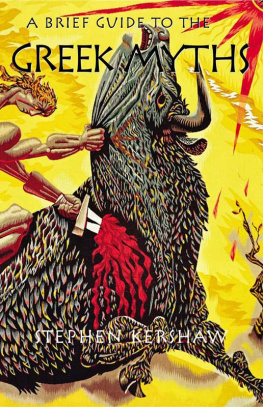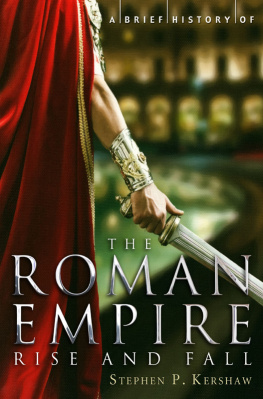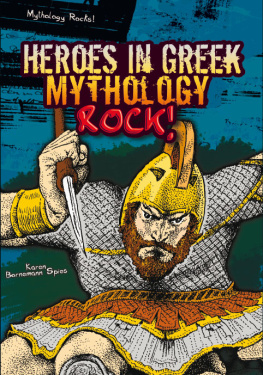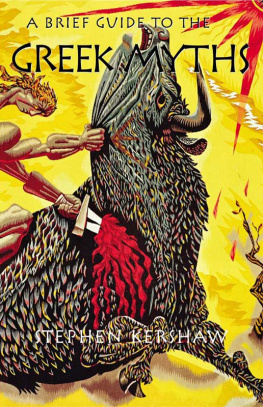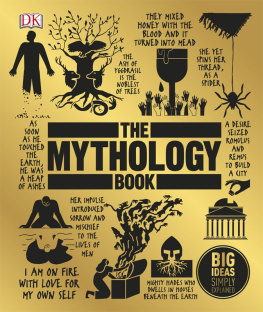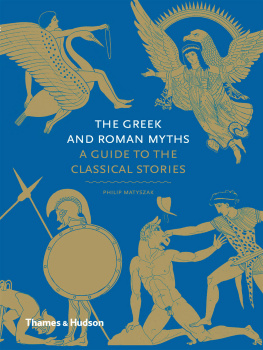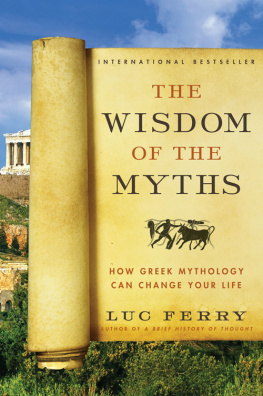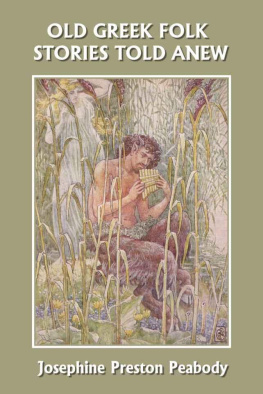Stephen P. Kershaw wrote his Ph.D. under Richard Buxton, arguably the leading scholar on Greek myths in the world. He has taught Classics in numerous establishments, including Oxford University Department for Continuing Education and Warwick University. He runs the European Studies Classical Tour for Rhodes College and the University of the South.
Also in the Brief Guide series
A Brief Guide to Islam
Paul Grieve
Titles available in the Brief History series
A Brief History of 1917: Russias Year of Revolution
Roy Bainton
A Brief History of the Birth of the Nazis
Nigel Jones
A Brief History of British Sea Power
David Howarth
A Brief History of the Circumnavigators
Derek Wilson
A Brief History of the Cold War
John Hughes-Wilson
A Brief History of the Crimean War
Alex Troubetzkoy
A Brief History of the Crusades
Geoffrey Hindley
A Brief History of the Druids
Peter Berresford Ellis
A Brief History of the Dynasties of China
Bamber Gascoigne
A Brief History of the End of the World
Simon Pearson
A Brief History of the Future
Oona Strathern
A Brief History of Globalization
Alex MacGillivray
A Brief History of the Great Moghuls
Bamber Gascoigne
A Brief History of the Hundred Years War
Desmond Seward
A Brief History of the Middle East
Christopher Catherwood
A Brief History of Misogyny
Jack Holland
A Brief History of Medicine
Paul Strathern
A Brief History of Mutiny
Richard Woodman
A Brief History of Painting
Roy Bolton
A Brief History of Science
Thomas Crump
A Brief History of Secret Societies
David V. Barrett
A Brief History of Stonehenge
Aubrey Burl
A Brief History of the Vikings
Jonathan Clements
A BRIEF GUIDE TO THE
GREEK MYTHS
STEPHEN P. KERSHAW
ROBINSON
London
Constable & Robinson Ltd
5556 Russell Square
London WC1B 4HP
www.constablerobinson.com
First published in the UK by Robinson,
an imprint of Constable & Robinson Ltd, 2007
Copyright Stephen P. Kershaw 2007
The right of Stephen P. Kershaw to be identified as the author of this work has been asserted by him in accordance with the Copyright, Designs and Patents Act 1988
Excerpts throughout totalling about 2,175 words from The Odyssey of Homer, translated and with an introduction by Richmond Lattimore, copyright 1965, 1967 by Richmond Lattimore. Reprinted by permission of HarperCollins Publishers.
All rights reserved. This book is sold subject to the condition that it shall not, by way of trade or otherwise, be lent, re-sold, hired out or otherwise circulated in any form of binding or cover other than that in which it is published and without a similar condition including this condition being imposed on the subsequent purchaser.
A copy of the British Library Cataloguing in
Publication data is available from the British Library
ISBN: 978-1-84529-512-7
eISBN: 978-1-47210-754-1
Printed and bound in the EU
1 3 5 7 9 10 8 6 4 2
To my three Graces: Lal of the beautiful tresses,
lovely-ankled Dorothy, and keen-scenting Hebe
CONTENTS
LIST OF MAPS
ACKNOWLEDGEMENTS
Many people are deserving of my warmest gratitude: Phil and Dorothy Kershaw, Cyril Kershaw, Alan Guy, Philip Highley, Frank Haigh, John Betts, Richard Buxton, Andy Thompson, Rob Butler and Alyn Shipton. Thanks also to Swan Hellenic Cruises; my numerous colleagues at Oxford University Department for Continuing Education, Warwick University, European Studies and TCU; and Sukie Christiansen. None of the people mentioned here are in any way responsible for the shortcomings of this volume. Any omissions are my responsibility.
Particular thanks are due to Becky Hardie, Leo Hollis, Claudia Dyer and Morag Lyall at Constable and Robinson, without whose help and expertise I would never have been able to bring this project to fruition. Libations are due to Tykhe, Kairos and Nemesis. Underpinning everything has been the loyal late-night companionship of my spaniel Hebe, and the invaluable support and understanding of my wife Lal.
INTRODUCTION
Greece: a land of mythical dimensions. Where the spirit of hospitality welcomes you as a modern god. And the siren song draws you into its deep, blue waters. Where a gentle breeze through ancient ruins seems to whisper your name. And a dance till dawn can take on Dionysian proportions. In Greece, the myths are still very much alive. And in amongst them sits your own... patiently waiting for you to live. Live your myth in Greece. Ask your travel agent.
Living in the twenty-first century we are constantly surrounded by the resonances of Greek mythology, and, though we seldom pause to reflect on it, we talk the language of myth all the time. We inhabit a chaotic world (Khaos was the primal void) where Trojan horses threaten our computers and Ajax is a cleaning product and a Dutch football team. Politicians dismiss their opponents opinions as myths (i.e. lies), while at the same time television archaeologists try to unearth the truth behind the myth of Atlantis. Centaurs grace the pages of C.S. Lewis Narnia books and J.K. Rowlings Harry Potter series; football managers say their star strikers have the Midas touch; a man can be an Adonis, a woman a siren or a harpy; and we all have our Achilles heel. Others are nymphomaniacs, use aphrodisiacs and read erotic literature all activities with Greek mythological semantic roots. Meanwhile we undertake Herculean tasks, wrestle with our Oedipus complexes, make personal odysseys, and should certainly beware of Greeks bearing gifts.
There is nothing new in our fascination with the myths: no self-respecting Renaissance palazzo was complete without an array of mythological paintings, perhaps with underlying meanings referring to the politics of the day; opera has constantly drawn on the corpus of Greek myths, from Monteverdis Orfeo through to Stravinskys Oedipus Rex and beyond; dance has done the same, be it classical ballet or more contemporary pieces such as Martha Grahams Andromaches Lament. Film thrives on a Greek background, drawing directly on such myths as Jason (Jason and the Argonauts, directed by Don Chaffey, 1963) and the Trojan War (Troy, Wolfgang Petersen, 2004, where the abduction of Helen becomes an excuse for an attack on an eastern state by a Greek superpower and has been seen as analogous to the recent American-led invasion of Iraq, which some commentators think has opened a Pandoras box in the Middle East), or operating more allusively as in Woody Allens Mighty Aphrodite (1995), which deals with the power of love and parodies Greek tragedy at the same time. Rock, jazz and other contemporary music styles draw on the myths too, from Led Zeppelins sublime Achilles Last Stand to Virgin Steeles ridiculous symphonic metal The House of Atreus, from Ivo Papasov and his Bulgarian Wedding Bands Orpheus Ascending to the tumbling chords of the Anglo-Scandinavian jazz trio Stekpannas Ikaros. Ian Hamilton Finlay created a stunning garden at Little Sparta, Joe Tilson produced a series of Nine Muses at the most recent Royal Academy Summer Exhibition. There is no escape from Greek mythology.
This book provides an overview of a large amount of the raw material of Greek mythology, and makes constant reference to the original source material, as the myths speak most effectively when they speak directly. Very often there are several versions of the same basic story, told for different reasons by different authors at different times and places, and many of these variants will be highlighted. The book will also attempt to explore some of the resonance and relevance of the tales of Greece, from ancient Greek times to the twenty-first century.
Next page
